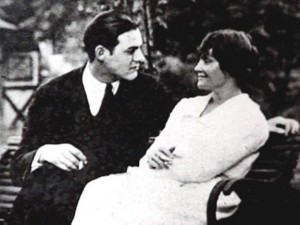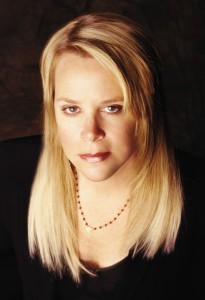 Mary Chapin Carpenter is een Amerikaanse singer/songwriter op leeftijd (56) met een prachtig en bezield stemgeluid dat me onmiddellijk raakt. Daarnaast is ze een echte verhalenvertelster. Ze begon in de jaren 80 als countryzangeres maar ontwikkelde zich vanaf 2000 tot singer/songwriter met een sociaal bewogen en politieke boodschap. Haar stemgeluid en teksten hebben een diepere lading, die onder andere voortkomt uit haar depressiviteit waar ze al sinds haar kindertijd last van heeft.
Mary Chapin Carpenter is een Amerikaanse singer/songwriter op leeftijd (56) met een prachtig en bezield stemgeluid dat me onmiddellijk raakt. Daarnaast is ze een echte verhalenvertelster. Ze begon in de jaren 80 als countryzangeres maar ontwikkelde zich vanaf 2000 tot singer/songwriter met een sociaal bewogen en politieke boodschap. Haar stemgeluid en teksten hebben een diepere lading, die onder andere voortkomt uit haar depressiviteit waar ze al sinds haar kindertijd last van heeft.
Toen ik haar lied Mrs Hemingway hoorde op het album The Age Of Miracles uit 2010, was ik gelijk geroerd. Het lied is een melancholische wals over Hadley Richardson (1891-1979), 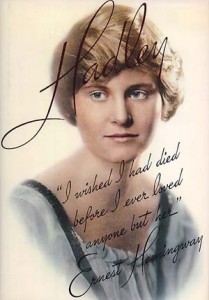 de eerste vrouw van de Amerikaanse schrijver Ernest Hemingway (1899-1961). Het stel trouwde in 1921 en woonde van van 1922 tot 1926 in Parijs, waar Hemingway werkte als buitenlandcorrespondent voor de Toronto Star. Hadley Richardson gaf hem alles waar hij van had gedroomd: een mooie vrouw, een comfortabel inkomen en een leven in Europa. In Parijs ontmoette hij schrijvers als James Joyce, Ezra Pound & Gertrude Stein. In 1923 werd hun kind John Hadley Nicanor Hemingway (1923-2000) geboren en in 1927 scheiden hun wegen, nadat hij vreemd was gegaan met Pauline Pfeiffer (1895-1951), die zijn tweede vrouw zou worden. Over zijn relatie met de eerste Mrs Hemingway schreef hij het boek A Moveable Feast (1964). Als reactie op dat boek schreef de Amerikaanse schrijfster Paula McLain het boek The Paris Wife (2012), met Hadley Richardson als de ik-figuur.
de eerste vrouw van de Amerikaanse schrijver Ernest Hemingway (1899-1961). Het stel trouwde in 1921 en woonde van van 1922 tot 1926 in Parijs, waar Hemingway werkte als buitenlandcorrespondent voor de Toronto Star. Hadley Richardson gaf hem alles waar hij van had gedroomd: een mooie vrouw, een comfortabel inkomen en een leven in Europa. In Parijs ontmoette hij schrijvers als James Joyce, Ezra Pound & Gertrude Stein. In 1923 werd hun kind John Hadley Nicanor Hemingway (1923-2000) geboren en in 1927 scheiden hun wegen, nadat hij vreemd was gegaan met Pauline Pfeiffer (1895-1951), die zijn tweede vrouw zou worden. Over zijn relatie met de eerste Mrs Hemingway schreef hij het boek A Moveable Feast (1964). Als reactie op dat boek schreef de Amerikaanse schrijfster Paula McLain het boek The Paris Wife (2012), met Hadley Richardson als de ik-figuur.
Mrs Hemingway
We packed up our books and our dishes,
our dreams and your worsted wool suits.
We sailed on the 8th of December.
Farewell old Hudson River,
here comes the sea.
And love was as new and as bright and as true,
when I loved you and you loved me.
Two steamer trunks in the carriage,
safe arrival we cabled back home.
It was just a few days before Christmas.
We filled our stockings with wishes,
and walked for hours.
Arm and arm through the rain, to the glassed-in café,
that held us like hot house flowers.
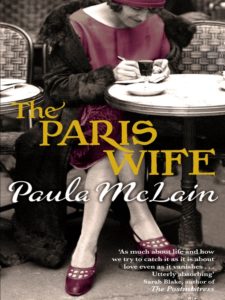 Living in Paris, in attics and garrets,
Living in Paris, in attics and garrets,
where the coal merchants climb every stair.
The dance hall next door is filled with sailors and whores,
and the music floats up through the air.
There’s Sancerre and oysters, cathedrals and cloisters,
and time with its unerring aim.
For now we can say we were lucky most days,
and throw a rose into the Seine.
Love is the greatest deceiver.
It hollows you out like a drum.
And suddenly nothing is certain.
As if all the clouds closed the curtains,
and blocked the sun.
And friends now are strangers in this city of dangers,
as cold and as cruel as they come.
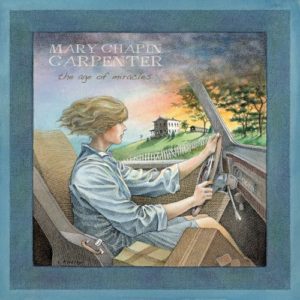 Sometimes I look at old pictures,
Sometimes I look at old pictures,
and smile at how happy we were.
How easy it was to be hungry.
It wasn’t for fame or for money,
it was for love.
Now my copper hair’s grey as the stone on the quay,
in the city where magic was.
Living in Paris, in attics and garrets,
where the coal merchants climb every stair.
The dance hall next door is filled with sailors and whores,
and the music floats up through the air.
There’s Sancerre and oysters, and Notre Dame’s cloisters,
and time with its unerring aim.
Back then we could say we were lucky most days,
and throw a rose into the Seine.
And now I can say I was lucky most days,
and throw a rose into the Seine.
